

Projet Ara : Toshiba dévoile ses modules photo. Le Projet Ara de Google commence doucement à prendre forme.
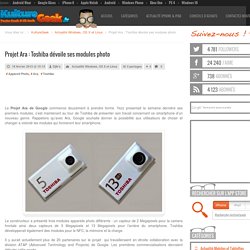
Yezz presentait la semaine dernière ses premiers modules, c’est maintenant au tour de Toshiba de présenter son travail concernant ce smartphone d’un nouveau genre. Rappelons qu’avec Ara, Google souhaite donner la possibilité aux utilisateurs de choisir et changer a volonté les modules qui formeront leur smartphone. Le constructeur a présenté trois modules appareils photo différents : un capteur de 2 Megapixels pour la camera frontale ainsi deux capteurs de 5 Megapixels et 13 Megapixels pour l’arrière du smartphone. Toshiba développerait également des modules pour le NFC, la mémoire et la charge. Il y aurait actuellement plus de 20 partenaires sur le projet qui travailleraient en étroite collaboration avec la division ATAP (Advanced Technology and Projects) de Google. Signaler une erreur dans le texte Merci de nous avoir signalé l'erreur, nous allons corriger cela rapidement.
Intéressant ? Restez connectés avec nous :-) LIVRE BLANC / Tendances Web & Design 2011-2012. Infographics. 17 paypal alternatives for easier e-commerce. - Webdistortion. Paypal is one of the biggest and most widely adopted forms of online payment on the web today.
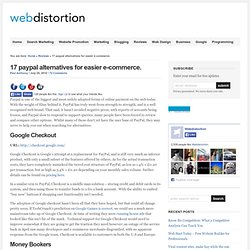
With the weight of Ebay behind it, PayPal has truly went from strength to strength, and is a well recognised web brand. That said, it hasn’t avoided negative press, with reports of accounts being frozen, and Paypal slow to respond to support queries, many people have been forced to review and compare other options. Stripe. Startup Café - Accueil. Laissez-nous votre paperasse, concentrez-vous plutôt sur votre métier ! Say Hello to the F-Commerce Ecosphere [Infographic. Janice Diner made a useful infographic summarising the current ‘ecosphere’ f-commerce and the six ways in which vendors are selling with Facebook.
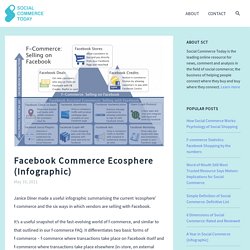
It’s a useful snapshot of the fast-evolving world of f-commerce, and similar to that outlined in our f-commerce FAQ. It differentiates two basic forms of f-commerce – f-commerce where transactions take place on Facebook itself and f-commerce where transactions take place elsewhere (in-store, on external e-commerce sites). This is a useful distinction. In the context of Facebook, the term ‘f-commerce’ is new, and an accepted industry-wide definition has yet to emerge.
Nominally f-commerce describes the range of activities in which Facebook is used to assist in the buying and selling of products and services. Like the term social commerce, f-commerce is used to describe a range of different activities, all related to buying and selling on Facebook. F-Commerce: Selling On Facebook. Les courts séjours des connaisseurs. The Times UK Lost 4 Million Readers To Its Paywall Experiment. Back in June, News Corp put two more of its newspapers, other than the Wall Street Journal, behind a paywall: The Times of London and the Sunday Times.

We kind of expected it to be a disaster, but now we actually have some results. The company announced that it signed up 105,000 paying subscribers, plus another 100,000 who were already subscribers to the print newspaper. But what did the Times lose? According to comScore, the Times UK website saw its online readership decline by 4 million unique visitors a month worldwide to 2.4 million, or a 62 percent drop. Pageviews fell off an even steeper cliff, plummeting 90 percent from an estimated 41 million in May, 2010 to 4 million in September, 2010. So is this tradeoff worth it and will other newspapers like the New York Times suffer the same fate once they erect planned paywalls? Are We Post-Digital Yet? - Teressa Iezzi and Ann-Christine Diaz. Nicholas Negroponte declared the digital revolution over in 1998.
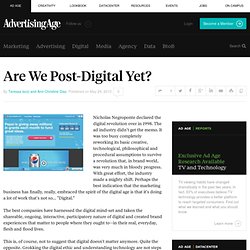
The ad industry didn't get the memo. It was too busy completely reworking its basic creative, technological, philosophical and procedural assumptions to survive a revolution that, in brand world, was very much in bloody progress. What are the most important search ranking factors? The biennial search ranking factors report from SEOmoz was released today, which surveyed 134 SEO professionals on what has the most effect on search rankings, and their views on the future of search.
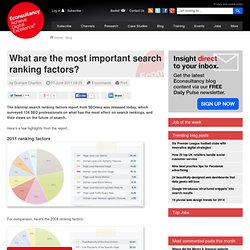
Here's a few highlights from the report... 2011 ranking factors For comparison, here's the 2009 ranking factors: Social signals One of the things that SEOs have been predicting over the past couple of years is the influence of social media on search engine rankings. In the 2011 chart above, page level social metrics is shown to be significant, and the questions SEOs have been asking is what social signals the search engines are looking for, and how influential they are. The report does find a correlation between sites with strong social metrics and those with higher rankings. The future of search. Modern brands 2.0: revenge of the corporation. Posted 08.12.10 by Adrian Ho I mentioned a while back that I thought big corporations were starting to adopt Modern Brand strategies with a twist.
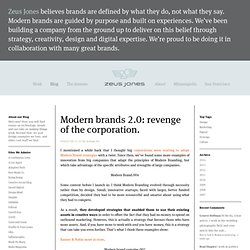
Since then, we’ve found some more examples of innovation from big companies that adapt the principles of Modern Branding, but which take advantage of the specific attributes and strengths of large companies.